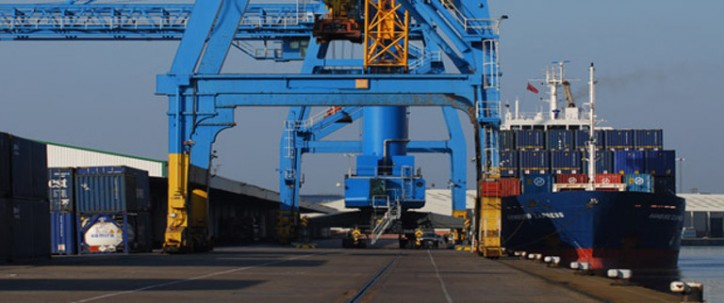Confidence in the strength of the UK and North of England economies has been boosted this week as ABP announced an investment of £50 million to more than double the capacity of its two Humber container terminals, in response to continued growth in demand.
The UK’s largest port operator has committed nearly £30 million to upgrading Hull Container Terminal including the purchase of four new Liebherr ship-to-shore cranes, two of which were delivered in 2016 with two more scheduled for delivery in 2018. The investment will increase capacity at the terminal to some 250,000 Twenty Foot Equivalent Units (teu) per year.
Immingham Container Terminal, which also took delivery of a new Liebherr crane in 2016, will be further extended with major investment in new equipment and technology, bringing capacity to 300,000 teu. The investment has coincided with a renewed focus on customer service with improved quayside handling rates and reduced waiting times for hauliers.

ABP Humber’s investment case is based on figures showing that across the Humber container terminals there has been a 41% growth in volumes since 2013. The business plan the company is working to anticipates significant continued growth in this area and discussions with current and potential customers have given ABP confidence that this trend looks set to continue in a post-Brexit economy.
This investment in the Humber comes on the back of the recent investment by ABP in Southampton of a further £50 million on a vehicle handling terminal which will predominantly be handling UK manufactured vehicles for export around the World. Taken together, this means that ABP has invested around £100 million since the EU referendum result was announced.
“We have seen significant growth at our Humber container terminals in recent years and all the indications are that this will continue despite Brexit,” says ABP Humber Director Simon Bird.
He continued: “We anticipate growth in container shipping in the coming years and ABP in the Humber are keen to position ourselves to take advantage of that growth. This is a huge vote of confidence in the economy of the North of England at this crucial time.”
The combined strength of ABP’s four ports on the Humber (Grimsby, Goole, Immingham and Hull) make up around half of the company’s revenue and roughly around 13% of all of the UK’s seaborne trade. The Humber estuary is increasingly being promoted by business and politicians as the UK’s energy hub with significant growth in the renewables sector along the Humber being a major part of that role.
Alongside this, the growth in container shipping is an indicator of how the economy is performing as a whole.
The Humber’s position in the middle of the country speaks for itself, but the strength of ABP’s Humber ports can be said to go well beyond geography. The Humber is one of Europe’s best-connected roll- on roll-off and lift-on lift-off hubs. The Humber offers a multitude of services providing links to a very high number of destinations, which gives businesses choice. Combine this with its close proximity to the main industrial and consumer centres of the North and the Midlands, and transport companies can make the most of their time and assets.
The Hull and Immingham investments are just a part of ABP’s commitment to £1 billion of investment across all its ports over the next five years. There are exciting times ahead, and the opportunities are about far more than excellent port operations.
ABP is one of the UK’s largest industrial landowners and within its total 12,000 acres there are significant land areas available for development. Some of this land is within the ports and some is in the near vicinity. All of it offers fantastic opportunities for activities such as port-based advanced manufacturing, automotive added-value, warehousing or cross-docking.
In particular, ABP has an eye on the possibility of new Free Trade Zones post-Brexit. These could allow for goods and parts to be imported, manufactured and re-exported from the designated Zone without incurring the usual import procedures or tariffs.
“Brexit represents opportunities for port-based, export led manufacturing, particularly if the Government was able to introduce Free Trade Zones at ports,” says Mr Bird. “This would provide great opportunities for customers to reduce costs for inbound materials and also take advantage of spare capacity in containers, trucks and ships, to re-export.”
ABP has a strong track record in providing major industrial and logistics facilities in the Humber for customers, including the recent investment Immingham Renewable Fuels Terminal, built for Drax, and Green Port Hull, developed for Siemens.
Source: ABP Ports